(Click here to read or re-read “Part 1”)
“Mining” Bitcoin
There are three ways to obtain bitcoins: 1) accept them as payment for goods and services, 2) buy them on an exchange, or 3) “mine” them by employing energy (in the form of electricity) to generate computing power. Almost 17 million bitcoins have been mined in just the past 7 years. An exponentially-increasing degree of difficulty means the 21 million bitcoin cap is not expected to be hit until the year 2140.
Bitcoin Miners Run Software to Find the “Key” That Opens a Lock to a Block of Transactions
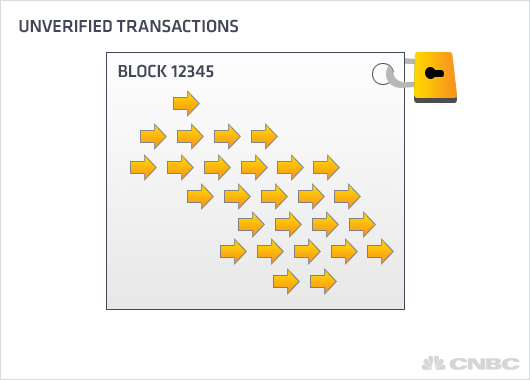
Bitcoin acts like cash when it is used in a transaction, but it can also be “mined” like gold. Bitcoin “miners” are paid in bitcoin for their work in verifying the transactions on the Bitcoin blockchain. The mining process consists of compiling recent Bitcoin transactions into “blocks” and trying to solve increasing complex math problems. The first person to “solve” the math puzzle gets to place the next block on the chain and is rewarded with an administrative fee and a “block” of bitcoins.
Let’s look at a simple transaction involving bitcoin: Cindy buys a necklace from Susan and pays her with bitcoin. In order to guarantee that Cindy’s bitcoin is real, miners rush to verify her transaction. Whoever does so first, gets bitcoin as a reward. This is a very simple example, but it basically describes what a bitcoin miner does.
Why doesn’t everyone with a computer mine bitcoins? Because scarcity and the rapidly-increasing difficulty of mining were built into the algorithm by Bitcoin creator Satoshi Nakamoto (a pseudonym based on a common Japanese name).
Bitcoin Mining Consumes More Energy Annually Than the Countries in Red Below
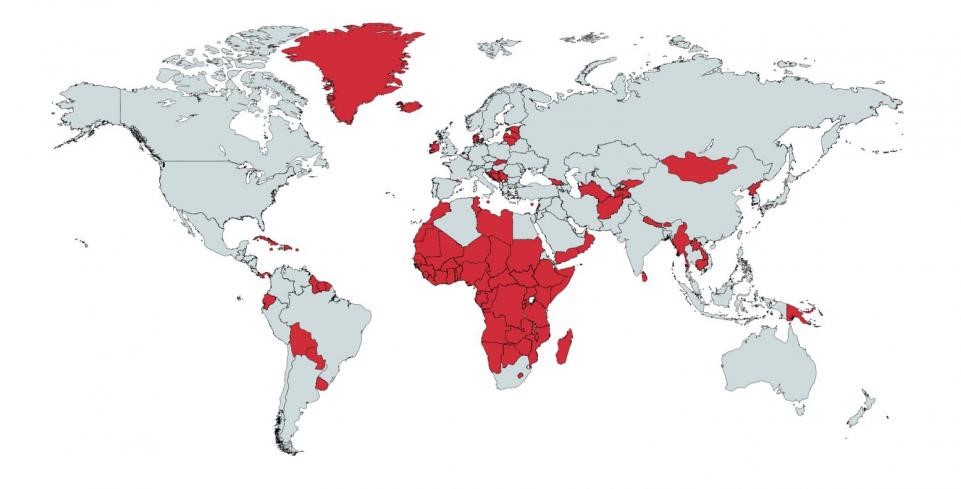
Source: Newsweek
As mentioned earlier, bitcoin mining will stop at 21 million bitcoins – but that’s not the only limiting factor. Mining bitcoin gets harder with time and computing power. The number of bitcoins paid out to bitcoin miners is halved after new 210,000 “blocks” are added to the blockchain. The bigger the blockchain, the fewer bitcoins a miner is able to claim for his or her increasingly difficult, electricity-sucking work.
The ever-increasing size of the Bitcoin blockchain demands more computing power to administer and navigate. Individuals once mined bitcoins using their home computers. Some surreptitiously used malware to infect other unsuspecting computers so they could hijack processing power and create even more. Not anymore.
The computing power necessary to create new bitcoin is so massive that a miner without specialized equipment runs the risk of losing money on electricity alone. The Bitcoin blockchain has gotten so large – and the math so complex – that special chips have been designed for the sole purpose of mining bitcoin.
As the size of the Bitcoin blockchain grows, the amount of electricity needed to mine bitcoins expands rapidly. Some have estimated that by 2020, all of the world’s energy will be required to mine bitcoin. It costs roughly $4,000 in electricity to mine a single bitcoin right now with relatively cheap power. This cost will continue to climb.
Is Bitcoin Real Money?
Not yet…
However, Bitcoin does meet much of the criteria for a currency: it is scarce; it is easily and infinitely divisible; and it is easily transportable anywhere by anyone connected to the internet. It is this reliance on a connection to the web that is its Achilles heel in our opinion. What happens to the Bitcoin blockchain if an Electro-magnetic Pulse (EMP) attack or series of EMP attacks in a global conflict shut down the internet?
Bitcoin enthusiasts point out that the vast majority of the world’s traditional money exists only as a series of ones and zeros and would be vulnerable to the same type of attack. They are right. However, the non-anonymous nature of our current financial database management means that there a number of ways, other than the internet, to prove ownership of money and property – starting with paper statements.
The Bitcoin blockchain has never been hacked, but plenty of bitcoin exchanges have, resulting in millions in losses. Probably the most famous Bitcoin exchange hack was the one that brought down Mount Gox, the largest Bitcoin exchange at the time of the attack. News of the hack sent the price of bitcoin sharply lower.
A huge number of bitcoins traded on that exchange, and others have either been stolen or simply disappeared. The anonymous nature of the Bitcoin blockchain also makes most stolen or lost bitcoins nearly impossible to track. The records are there somewhere in the blockchain, but without the proper encryption keys, they are inaccessible. Lose your encryption key and you lose your bitcoin.
Bitcoin’s biggest problem as “money” is its volatility. With movements of 15 to 20 percent or more over the course of a single trading day, bitcoin is unsuitable for basic commerce at this point in time. Would you accept bitcoin in exchange for a good or service, knowing it could be worth 20% less by nightfall? Would you spend bitcoin to buy a good or service if there was a reasonable chance that the dollar value of that bitcoin you are using to buy that good or service would spike 20% the next day? The answer to both questions is probably “no.”
Is Bitcoin a Store of Value?
The answer has to be an unequivocal “yes” – at least so far.
An investment in bitcoin has surpassed returns in gold, silver, stocks, bonds and virtually every other traditional investment. Will it continue to do so? Bitcoin is displaying nearly all the signs of a mania – including a “hockey stick” chart pattern. It has also captured the fancy of the mainstream financial media after years of lurking in the netherworld of the dark web. CNBC now posts its dollar value on an almost daily basis.
How much longer will the party last? There is no telling. Bitcoin is still too volatile to be used as a practical currency. Since we can’t see it, touch it or experience it in any way, its only function right now – apart from dealings on the dark web – is as a store of value – albeit the most speculative one ever created.
We hear the hard-money crowd screaming right now, “Bitcoin is based on nothing! How can nothing be a store of value? In fact, how the heck can nothing be worth anything, period???!!!”
The answer can be summed up in one word: “belief.”
Things are ultimately worth what other people will pay for them, whether it’s tulip-bulbs, dot-com stocks or the pieces of computer code we call “bitcoin.” What people will pay is often based on nothing more than the belief that the “thing” (whatever it is) will be worth more at some point in the future.
Belief can also be communal and collective. Think about any cash transaction. A cash transaction can only take place if both parties agree that the paper notes being exchanged are worth the amount printed on them. Since modern cash is not backed by gold, silver or any other fixed asset beyond the “good faith and credit” of the government issuing it, cash transactions are, in effect, based solely on collective belief.
The only thing that makes a $100 bill worth $100 is the shared belief that $100 is what it is worth. There is really nothing else behind it. The same goes for gold, art, collectibles or any other non-income producing asset.
Bottom Line: Enough people believe in bitcoin right now to give it a current market capitalization of nearly $265 billion. That means these pieces of computer code based on “nothing” are definitely worth something – at least for the time being.
Who Is Buying Bitcoin Now?
China made up the lion’s share of Bitcoin trading until the Chinese government clamped down in November by banning all commercial trading of Bitcoin. This did not stop the bull market. The action just moved elsewhere. By the end of November 2017, 80% of global Bitcoin trading occurred in Japan, South Korea and Vietnam. Since then, South Korea made moves to limit Bitcoin trading while Japan accepted it as legal tender. Not surprisingly, the bulk of Bitcoin trading on electronic exchanges now occurs in Japan.
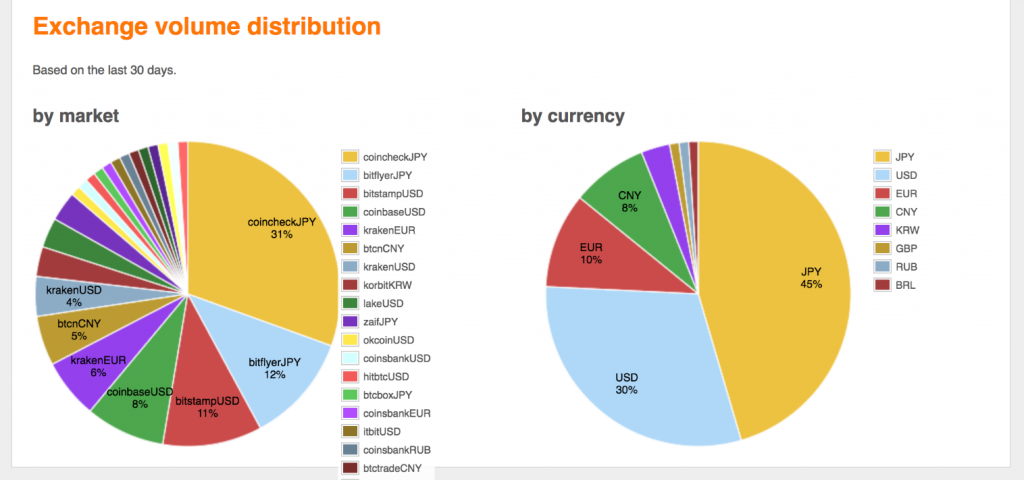
Source: Yahoo Finance
The popularity of bitcoin in Asia makes sense. These nations have a history of governmental meddling, including currency controls, market manipulation and outright confiscation. Asia is not the only place Bitcoin is exploding. Bitcoin is becoming a big hit in countries that face currency troubles, including Africa, Russia and Venezuela. The number of new Bitcoin traders in South Africa rose 671% in the first 11 months of last year.
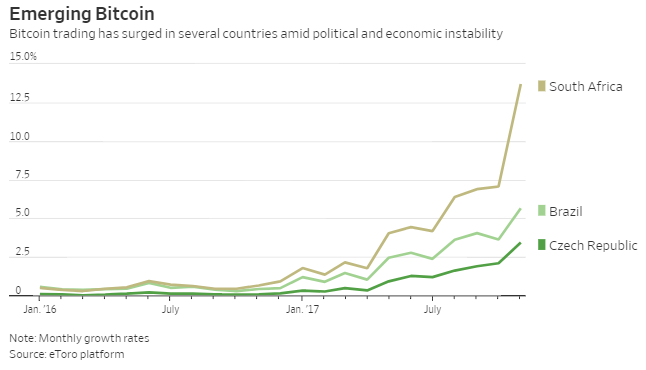
Individuals looking to protect themselves have historically turned to other stores of value like gold – or copper in the case of China. But these “hard money” alternatives have disadvantages. They are not easy to transport and, because they are vulnerable to theft, must be stored in secure places. It costs money to store and transport physical gold and silver. Both metals can also be confiscated.
It costs nothing to store or transport bitcoin anywhere in the world with an internet connection, and to do so anonymously. Bitcoin can be converted into any major sovereign currency quickly and easily without a middleman. This makes it a preferred choice for Asians and anyone else who wants to move money from one country to another without being noticed. Unlike metals, bitcoin cannot be confiscated.
Some are blaming Bitcoin for the lackluster price action in gold and silver that has dominated the past three years of trading, despite a shrinking US dollar, rising global tensions and the very real possibility of war on the Korean peninsula. If the success of Bitcoin is coming at the expense of gold and silver, then investors may want to take a look at long positions in both metals as a way to play the potential for a meltdown in the world’s most popular crypto-currency.
Millennials Like Bitcoin
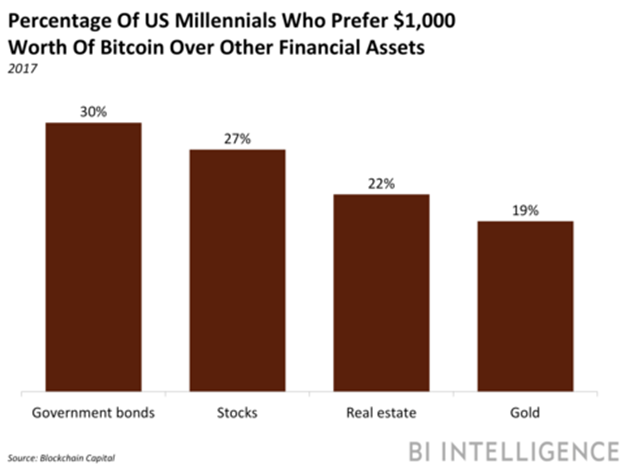 Bitcoin’s future as both a store of value and as a legitimate currency ultimately rests with the generation most comfortable with the internet. Millennials grew up with technology. Many have embraced automatic, algorithmic investing – leaving it up to computer programs to decide where and when their saving are invested. It is no surprise that they have embraced Bitcoin as well.
Bitcoin’s future as both a store of value and as a legitimate currency ultimately rests with the generation most comfortable with the internet. Millennials grew up with technology. Many have embraced automatic, algorithmic investing – leaving it up to computer programs to decide where and when their saving are invested. It is no surprise that they have embraced Bitcoin as well.
Thirty percent of Millennials prefer Bitcoin over bonds, 27% over stocks and 22% over real estate. Only 19% prefer Bitcoin over gold. The Midas metal is not giving up its reputation as a store of value any time soon, despite being upstaged by Bitcoin and other crypto-currencies right now.
Enter the Middlemen
Bitcoin founder Satoshi Nakamoto created the very first bitcoins in 2009 as a direct response to the 2008 global financial collapse – a catastrophe aided and abetted by the rampant greed embedded in the banking system. He (or she, or them) wanted to create a currency which could be traded peer-to-peer and circumvent corporations, bankers and governments. While the Bitcoin blockchain accomplishes that, the complexity of blockchain technology coupled with its rapid growth have attracted a whole bunch of middlemen, starting with Bitcoin exchanges.
Because Bitcoin is too intimidating for non-technical participants, the vast majority of it is traded on a large number of different electronic exchanges, each of which exists to make the transfer of bitcoins between buyers and sellers easier. Exchange participants must have a digital “wallet” that can accept as well as dispense bitcoin. Like nearly all exchanges, bitcoin exchanges make money by either charging fees or making a market and collecting the difference between the “bid” and “ask” price of the bitcoins traded on the exchange.
Traders are expected to “settle up” with the exchange in real time in dollars, yen or whatever currency is used to price Bitcoin on that electronic exchange. Failure of any large exchange participant to settle up, caused by unexpected volatility or a service crash, can negatively impact the viability of the exchange itself and result in losses by exchange participants.
Volatility and Hacking Are Real Threats
Volatility can also wreak havoc with the smooth functioning of an electronic Bitcoin exchange. It hinders the ability of participants to exit or enter positions especially when bid / ask spreads widen precipitously. Many exchanges – even some of the larger, respected ones – will simply stop trading rather than assume the risk of standing on the other side of a transaction that could result in a loss due to volatility. This situation could make it impossible for exchange participants to enter or exit a position.
Electronic exchanges and digital wallets are designed to interact with the Bitcoin blockchain, but they are not part of it. Like any centralized database, they are vulnerable to hackers. The anonymous nature of the Bitcoin blockchain makes bitcoin lost or stolen as a result of a hack virtually impossible to trace or recover. Hacking has always been, and will probably continue to be, a problem for speculators and investors using electronic exchanges to buy and sell Bitcoin.
Editor’s Note: “Part 3” will examine the new Bitcoin futures contracts and how they could be used to gain certain advantages over the electronic exchanges currently used to trade bitcoin. We’ll also explore some long and short Bitcoin trading strategies that could provide powerful Alpha to any traditional portfolio.
Getting Started
The RMB Group has been helping clientele trade futures and options since 1984. RMB Group brokers are very familiar with the new Bitcoin futures contracts covered in “Part 3” of this report. A full PDF version of this report is available now. Call us toll-free at 800-345-7026 or 312-373-4970 direct to receive one. RMB Group trading customers who wish to receive the full report now can also contact their personal broker.
If you are new to futures and options and want to learn more about them, download the RMB Short Course in Futures and Options. This free, easy-to-read guide covers all the basics. Call us toll-free for your free copy or go to our website at www.rmbgroup.com. Click the “Education Tools” tab at the top of the home page and scroll down to find the report.
* * * * * * * *
The RMB Group
222 South Riverside Plaza, Suite 1200, Chicago, IL 60606
This material has been prepared by a sales or trading employee or agent of R.J. O’Brien and is, or is in the nature of, a solicitation. This material is not a research report prepared by R.J. O’Brien’s Research Department. By accepting this communication, you agree that you are an experienced user of the futures markets, capable of making independent trading decisions, and agree that you are not, and will not, rely solely on this communication in making trading decisions.
DISTRIBUTION IN SOME JURISDICTIONS MAY BE PROHIBITED OR RESTRICTED BY LAW. PERSONS IN POSSESSION OF THIS COMMUNICATION INDIRECTLY SHOULD INFORM THEMSELVES ABOUT AND OBSERVE ANY SUCH PROHIBITION OR RESTRICTIONS. TO THE EXTENT THAT YOU HAVE RECEIVED THIS COMMUNICATION INDIRECTLY AND SOLICITATIONS ARE PROHIBITED IN YOUR JURISDICTION WITHOUT REGISTRATION, THE MARKET COMMENTARY IN THIS COMMUNICATION SHOULD NOT BE CONSIDERED A SOLICITATION.
The risk of loss in trading futures and/or options is substantial and each investor and/or trader must consider whether this is a suitable investment. Past performance, whether actual or indicated by simulated historical tests of strategies, is not indicative of future results. Trading advice is based on information taken from trades and statistical services and other sources that R.J. O’Brien believes are reliable. We do not guarantee that such information is accurate or complete and it should not be relied upon as such. Trading advice reflects our good faith judgment at a specific time and is subject to change without notice. There is no guarantee that the advice we give will result in profitable trades.
This report was written by Investors Publishing Services, Inc. (IPS). © Copyright 2018 Investors Publishing Services, Inc. All rights reserved. The opinions contained herein do not necessarily reflect the views of any individual or other organization. Material was gathered from sources believed to be reliable; however no guarantee to its accuracy is made. The editors of this report, separate and apart from their work with IPS, are registered commodity account executives with R.J. O’Brien. R.J. O’Brien neither endorses nor assumes any responsibility for the trading advice contained therein. Privacy policy is available on request.